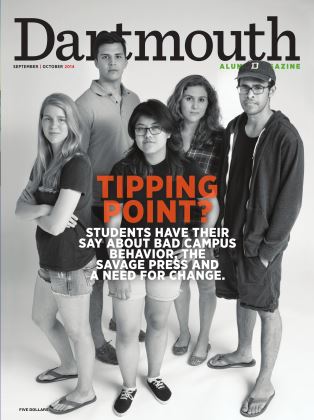Human rights advocate champions Internet access for all.
EILEEN CHAMBERLAIN DONAHOE '81
AILEEN YINGST '91
CHRISTOPHER SWIFT '98
TOM PASKUS '89
MATTHEW DICKERSON '85
CASE HATHAWAY-ZEPEDA '09
AN AMBASSADORSHIP MAY SEEM LIKE a plum assignment, but the post President Obama offered Donahoe in 2009 was anything but. The president tapped Donahoe to become the first- ever U.S. ambassador to the United Nations Human Rights Council (HRC)—a body previously boycotted by the United States and described as "highly dysfunctional" by The New York Times. "Colleagues and friends I respect told me not to take the job. They thought the HRC was hopeless and that I'd fail," she says. But where others saw a bureaucratic basket case, Donahoe saw opportunity. She believed "principled pragmatic engagement" could help build a more effective institution. "To me, any opportu- nity to move the dial on human rights globally was worth the risk. It turned out to be a gold mine opportunity for the United States to exert influence and promote our values in a way that exceed- ed our expectations," says Donahoe, who stepped down from her U.N. post at the end of last year and now continues her advocacy work as director of global affairs for Human Rights Watch.
The 2011 crisis in Libya was a turning point, she says. When long-time leader Muammar el-Qaddafi responded to an armed rebellion with a brutal crackdown, the U.N. general assembly voted to revoke Libya's membership in the council—the first time a country had ever been ejected for human rights violations. Donahoe says that while this move may seem obvious from afar, it represented a major step for the HRC. "In the past, countries protected one another," she says. "We consciously worked to change those dysfunctional dynamics." Donahoe's ambassadorship also gave her a chance to make progress on an issue that's become increasingly important to her: Internet freedom. During her tenure she helped persuade council members to pass a resolution affirming rights to freedom of expression and association online. "We had a window of opportunity and we acted," says Donahoe, explaining that as recently as 2011 many governments had not yet grasped the potential of the Internet to disrupt their grip on power. She doubts the resolution would pass today.
Internet freedom might seem an abstract issue, but it keeps Donahoe up at night. "Many people in my life, even my husband [eBay president and CEO John Donahoe '82, a former Dartmouth trustee], are mystified by my passion on this issue," she laughs. "But it became obvious to me early on that Internet freedom is the new battleground. If you don't protect the platform where people exercise their rights, then you're not protecting their rights."
Donahoe has spent most of her adult life with John in Silicon Valley, raising four children—including Thomas '09 and Catherine '15—and earning degrees from Stanford (J.D. and a master's in East Asian studies), Harvard (a master's in theological studies) and Cal-Berkeley (a Ph.D. in ethics). "I've been infused with the tech culture that exists here," she says. Donahoe sees "serious threats" to the free flow of information online and the ability of people worldwide to exercise their rights online.
From her new post at Human Rights Watch, Donahoe promotes a system of Internet governance that stays the hand of authoritarian regimes. She seems invigorated by the challenge. "Even when everyone else's eyes glaze over, follow what speaks to your heart. That's where you'll have an impact," she says.
Donahoe was the first U.S. ambassador to the U.N. Human Rights Council.««
"It became obvious to me early on that Internet freedom is the new battle- ground " says Donahoe.
ANDREA USEEM has worked as a foreign correspondent in East Africa and an editor at The Washington Post.
 View Full Issue
View Full Issue
More From This Issue
-
 FEATURE
FEATUREThe Rookie
September | October 2014 By Matthew Mosk ’92 -
 COVER STORY
COVER STORYWhat’s Going On Here?
September | October 2014 By Jennifer Wulff ’96 -
 Feature
FeatureCan Students Police Themselves?
September | October 2014 By EVA XIAO ’14 -
 Feature
FeatureOff the Beaten Path
September | October 2014 By RIANNA P. STARHEIM ’14 -
 Feature
FeatureNotebook
September | October 2014 By JOHN SHERMAN -
 Feature
FeatureClass Notes
September | October 2014 By DARTMOUTH COLLEGE LIBRARY
Article
-
 Article
ArticlePROFESSOR C. A. HOLDEN TOURING IN SOUTH
June, 1923 -
 Article
ArticleTHE FUND AND FINANCES
October 1933 -
 Article
ArticleSnow Train
March 1935 -
 Article
ArticleCollege with an Upper-case "C"
June 1976 -
 Article
ArticleDartmouth Authors
September 1978 -
 Article
ArticleTHE LIFE AND LETTERS OF NATHAN SMITH, M.B., M.D.
November, 1914 By Emily A. Smith, C.C.S.


